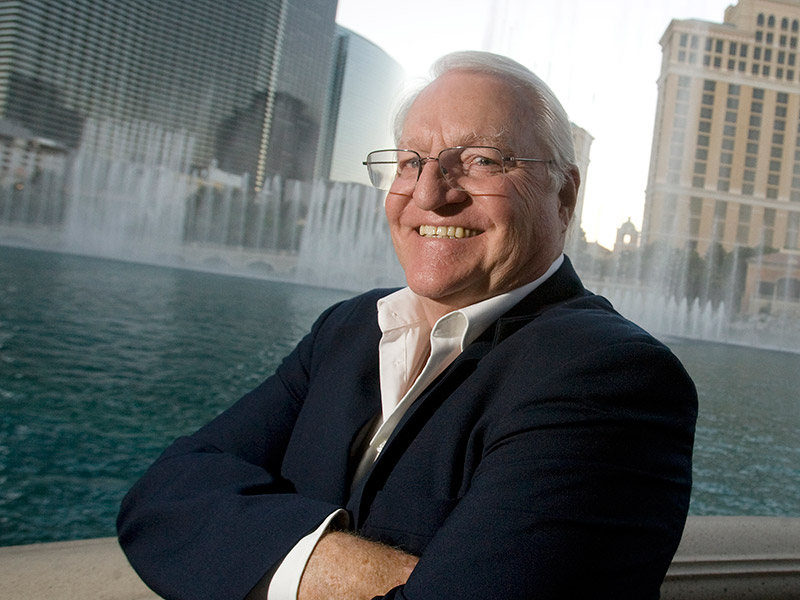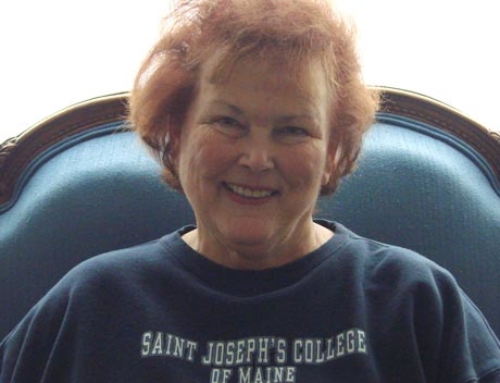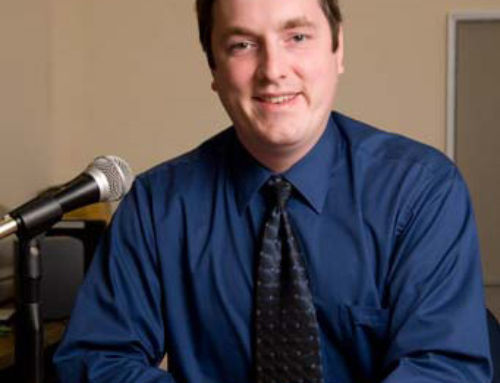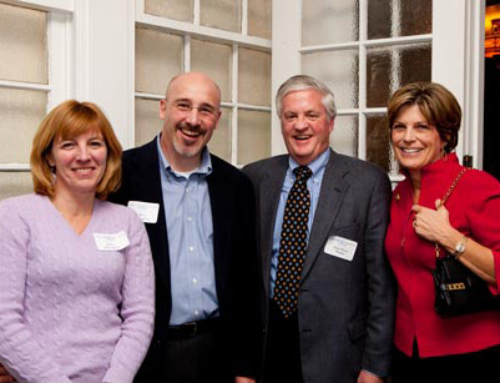Never compromise your values. Do take care of your people and help them succeed.
Larry Messner of Las Vegas teaches the first course, Leadership in Health Care Administration, and the last course, Applied Management Capstone Project, for graduate students in the Saint Joseph’s master’s degree program in health administration. He is a man who loves what he does.
To Larry Messner, who teaches Leadership in Health Care Administration online for Saint Joseph’s, these points represent the very heart of leadership and define who he is as an educator, husband, father, and retired Air Force lieutenant colonel. He believes that by both sharing his life experiences with his master’s degree students in health care administration and enabling them to discover their own core values, effective and ethical leaders can emerge.
Messner learned about himself and his values from his family, while growing up in the Queens section of New York City. He developed his skills and abilities while serving in the United States Air Force from 1966 to 1989. It wasn’t always easy.
“The military doesn’t give you a lot of time to discover how to lead, they just put you in a leadership position. At age 25, I was put in charge of a group of 30 to 40 airmen. It was frightening,” he says. “But I had a warrant officer who took me under his wing and taught me how to lead.”
He remembers one troublesome sergeant who constantly disrupted the unit. The warrant officer suggested Messner put the sergeant in charge of a personnel section to give him responsibility. The change was remarkable, says Messner, as the sergeant became one of his best workers. It showed him that “You can trust your people and delegate … and then let them do their job their way. Observe from a distance, but don’t micromanage. That was a very valuable and early leadership lesson for me.”
Thanks to the Air Force, Messner earned undergraduate and graduate degrees in personnel management from Syracuse University. He served in Korea, England, Italy, Germany, and the United States, including the nation’s capital. As his ranking increased, so did his responsibilities. He wrote the Air Force Command and Leadership Course for officers in Washington, D.C.; served as director of personnel for all military and civilian programs on a base in southern Italy; and established Family Support Centers on every Air Force base in Europe and the Middle East.
Several appointments held special meaning. “Serving as aide-to-camp to the commander in Washington, D.C., brought me face to face with heads of state from around the world,” he says. “I saw them up close and observed how they acted, spoke and conducted themselves.”
In Italy, he developed one of his leadership theorems – Management by Wandering Around. He calls it the MBWA degree. “A leader can’t sit at a desk all the time and wait for people to come by,” Messner says. “It’s amazing what you learn when you’re out among your employees. They won’t tell you about broken equipment and funny odors. But if you know about these things, you have the power to fix them. And employees who have what they need are more likely to succeed. And when they succeed, the organization succeeds and you do, too.”
He believes that everyone can be a leader. “We’re all born with certain traits and skills, but you have to learn how to apply them. That’s what you learn in the classroom and in life. Leadership is at every level,” Messner says.
Messner has been teaching health care administration courses at Saint Joseph’s College since 1990. He lives in Las Vegas with his wife of 48 years, Dolores, and they have three grown children. Teaching suits him “to a tee,” he says.
He enjoys telling stories, even when he “tells” them online, because “They make dry theories come alive.” Messner says he is more interested in applying theories of leadership because the term leadership is nebulous and taught in so many different ways. He says one of the key ways to convey how it’s applied is through stories.
“I tell the longer stories in my instructor notes, which the students read in addition to the texts. I also add short stories and notes right into their assignments as I correct them, sometimes as much as two paragraphs when appropriate.” The students have always responded in a positive manner, and he gets constant feedback from them that they really enjoy his comments.
One story he tells is about working on a farm as a teenager. Late one night, his boss delegated a chore, directing Messner to drive the farm truck (now overloaded with hay) back to the barn. Despite the fact he had never driven a truck, he made it to the barn (all the way in second gear), learning at an early age that a boss could delegate and trust his employees.
In his leadership course, Messner uses introspective essays and self-surveys to get students to learn about themselves and the values that are important to them. “The challenge is making people understand that values are so critical in terms of leadership,” he says. “Getting things done in an ethical, moral way should always be the goal. And if you’re working for an organization that is forcing you to compromise your values, strongly consider leaving.”
When Messner was asked to write the leadership course curriculum, Enron, AIG and other disastrous leadership examples were exploding around him. He didn’t want to teach another mundane course on leadership.
“I saw a pattern of unethical behavior in our corporate and government leaders that unfortunately continues to this day. So I decided to create my leadership course about how a proper, ethical person should lead,” he says. Messner believes that if leaders are going to be successful and help their people, they have to develop personal values to lead in a way that benefits everyone.
Twila Weiszbrod, the director of the Health Administration Program, has known Messner since 2003. She described him as “very encouraging and affirming, knowledgeable, but humble, and a consistent and dedicated educator.” One of his most important contributions is running the annual health care symposium. Held every summer, it brings 10 expert speakers to campus for a week. “This important event demands diligence, attentiveness, and leadership,” says Weiszbrod. “Larry manages it with so much grace that he makes it look easy.”
His achievements as a leader and an educator have been recognized by the military and academia. The Air Force awarded him numerous medals and ribbons/citations, including the Meritorious Service Medal and the National Defense Service Medal. He has also received three prestigious teaching awards from the College – “Outstanding Faculty Award” in 1998 and 2007 and “Outstanding Dean’s Award” in 2004.
“Leadership isn’t about you,” Messner says. “The real challenge of leadership is earning the loyalty, devotion, respect, and enthusiasm of your subordinates. You’ll never be able to lead until you can empathize with them. The best way to develop that empathy is to know yourself and to put yourself in other people’s situations.”
What his students say
Larry Messner admires his students because many have families and full-time jobs and haven’t been in school for 10 or 20 years. Based on comments from three of his students, it appears that the feeling is mutual:
“Professor Messner inspires confidence. He is very open-minded and relaxed, yet passionate about his views,” said Nazish Amir-Siddiqi, a quality assurance director at Horizon Health Center in New Jersey. “He made me think outside the box and push myself to excel.”
Amir-Siddiqi took Messner’s online course in 2009 and expects to graduate this December. She holds an undergraduate degree from the University of Ottawa and a mini-MBA from Rutgers University. Her future plans include earning a doctorate in public health and working in academia.
She applies what she learned from Messner on a daily basis. “I had difficulty delegating in the past because I feared that things would not be done right. I now understand why delegating is essential for a leader’s success. It gives a leader the ability to prepare,” she explained. “Another important lesson that Professor Messner emphasized was this: ‘Never say I hope because hoping doesn’t get you anywhere. Be affirmative and do. Leaders and top executives do, they don’t hope.’ This is good advice for the work environment and day-to-day life.”
Violetta Karras, MD, took Messner’s leadership course on campus during the summer of 2007 and returned this past July to attend the week-long health care symposium. “Mr. Messner is probably one of the best professors I’ve ever had during my academic career,” said the New Orleans resident. “He challenged us and taught us human lessons, life lessons.”
Karras earned her undergraduate degree at the University of Louisiana at Lafayette and her medical degree from St. Matthew’s University School of Medicine in the Cayman Islands. She expects to complete her master’s in health administration in May.
Her next steps include working in health care for a few years and completing her three-year residency. Eventually, she wants to open her own private practice in family medicine. “I’m working part time in family medicine now, and I see opportunities to apply things from the course,” said Karras. “My class experiences have been invaluable and I’ll always carry them with me.”
Brad Owen has been a radiation therapist at Central Maine Medical Center in Lewiston for 10 years. He took Messner’s online leadership course last year. “I was very scared about coming into a master’s program online. I wasn’t sure how I was going to do it. Mr. Messner sent out an e-mail before the class started so he could get to know his students,” said Owen, who has degrees in fitness management, physical education, and radiation therapy. “I was very impressed with him. He has the ability to help you come to an answer without giving you the answer.”
Owen, who is married with five children, learned many lessons from the course. “The most important one was transparency, being open and honest,” he said. “I eventually want to have a management position at the hospital. Mr. Messner has given me tools to lead and to succeed. But if I ever have a question or problem, I can always reach him.”




